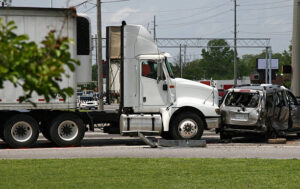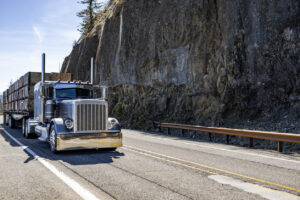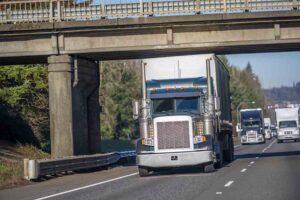SAN FRANCISCO — In a new study, business technology company Motive reports that companies in the trucking, logistics, oil and gas industries have experienced an average loss of more than $1 million due to economic instability, labor issues and operational inefficiencies.
The Motive Physical Economy Outlook 2024 also explains how leaders in those industries are looking to turn the tables around in 2024 by using newly popular technology: artificial intelligence (AI)
Managing physical operations has become more challenging because of economic issues, employment, outdated technology, safety concerns and issues and more, according to a news release.
Motive dove deep into said challenges of industry leaders in the past year and what lies ahead in the year to come and surveyed 1,000 leaders in the transportation industry.
Co-founder and CEO of Motive, Shoaib Makani, said, “Over the past year, leaders in the physical economy grappled with rising uncertainties, escalating costs, increasing fraud, and a scarcity of skilled labor.” He continues, “The need for transformation is evident, with limited visibility and data silos hampering profitability and heightening safety risks. Leaders recognize technology, particularly AI, as a game-changer for automating proactive decisions, improving visibility, and enhancing safety, effectively addressing industry challenges and presenting opportunities across this critical sector of our economy.”
Key findings of Motive’s Physical Economy Outlook 2024 report include:
Rising costs, economic instability, and labor shortages have left leaders grappling with revenue losses and an uncertain economic outlook.
- The top five challenges that threatened physical operations in 2023 include rising costs (59%), economic instability (51%), labor shortages and talent retention (45%), supply chain disruptions (42%), and operational inefficiencies (36%).
- Half of the leaders think that 12 months from now, the economy will be better than it is today, while 18% expect it to be about the same, and 32% expect it to be worse.
Leaders lack a single, 360-degree view of their operations due to data silos and lack of integration.
- Nearly half (46%) of leaders are using more than ten individual tools to manage their operations, with 30% saying it’s too many to count.
- As a result, 58% say they spend most of their time dealing with reactive issues versus proactively managing their workers, fleet, spending or assets and equipment. A total of 44% of leaders admit to losing track of vehicles at least monthly.
Fraud is an invisible financial drain, and leaders struggle to pinpoint its origin or extent.
- A total of 44% of physical operations leaders say fraud has a significant financial impact on their business, but they aren’t sure how to find it. Among the c-suite, this jumps to 57%.
- On average, leaders estimate that 19% of their current fleet spending may be fraudulent, with construction leaders estimating fraud as high as 22%.
Leaders see technology as one of the only aspects of their operations that they can consistently control.
- The top five opportunities for physical operations over the next 12 months include updated technology and software (33%), economic stability (31%), supply chain improvements (31%), increase in demand (30%), and operational efficiencies (29%).
- A total of 80% of leaders agree that having a single, end-to-end solution to manage physical operations would make their job easier.
From addressing labor shortages to boosting visibility and road safety, AI is becoming critically important for managing physical operations.
- The top five areas where leaders see AI bringing the most value include tracking assets and vehicles (43%), more accurate decision-making (40%), expense planning (39%), reducing administrative work (39%) and detecting fraud (38%).
- A total of 69% of physical operations leaders think AI will positively impact their jobs, and nearly a third expect AI to address labor shortages.
- A total of 73% of leaders agree that roads are safer with AI-enabled cameras, and 64% say AI is crucial for preventing accidents and coaching drivers.
Download Motive’s Physical Economy Outlook 2024 for deeper insights into the state of the physical economy.
Born and raised in Little Rock, AR, Erica N. Guy decided to stay in her hometown to begin her professional career in journalism. Since obtaining her bachelor’s degree from UAPB, Erica has professionally written for several publications about several topics ranging from lifestyle, tech, culture, and entertainment, just to name a few. Continuing her love for her hometown, she joined our team in June 2023, where she is currently a staff writer. Her career goals include continuing storytelling through her writing by being the best professional writer she can be. In her spare time, Erica enjoys trying new foods, cozying up with a good book, spending time with family and friends, and establishing herself as a future businesswoman.








